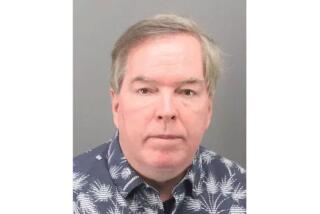3 1/2-Year Term Given in Phony Billing Scheme
- Share via
James Dean McCollum Sr. of Anaheim, awaiting trial in state court on a $2-million embezzlement charge and already on probation for a 1979 equipment leasing fraud conviction, was sentenced Monday to 3 1/2 years in federal prison for his part in a nationwide phony billing scheme.
He had been convicted May 8 on six counts of mail fraud and using fictitious names in connection with sending out what appeared to be legitimate advertisement invoices for a fictitious publication using the name, “Energy Report and Industry News.”
“In fact, there was never an edition published and none of the victimized companies owed money for any ads,” said Assistant U.S. Atty. David A. Katz, who prosecuted the case. He said evidence at the trial of McCollum, 52, showed he helped Delmar R. Swann, 53, of Cypress, set up the coast-to-coast billing scheme.
Swann, regarded by postal authorities as the organizer of the scheme and the subject of extensive investigations by U.S. Postal Inspectors for several years, was sentenced earlier this month to four years in prison.
According to the indictment returned against McCollum, he accomplished his principal role in the scheme--”laundering” the bilked firms’ payment checks--by using his son, James Jr., as a middleman to open a bank account through which checks could be deposited and cash withdrawn.
The son and two other defendants in the case pleaded guilty and received light sentences in return for cooperating with the government’s investigation.
The senior McCollum’s federal court conviction in May came just one month after he was charged in Los Angeles Superior Court with taking part in the theft of $2 million from bank accounts of the Fund for Higher Education, a philanthropic organization that raises money from major corporations to provide grants to colleges across the country and in Israel.
More to Read
Sign up for Essential California
The most important California stories and recommendations in your inbox every morning.
You may occasionally receive promotional content from the Los Angeles Times.









